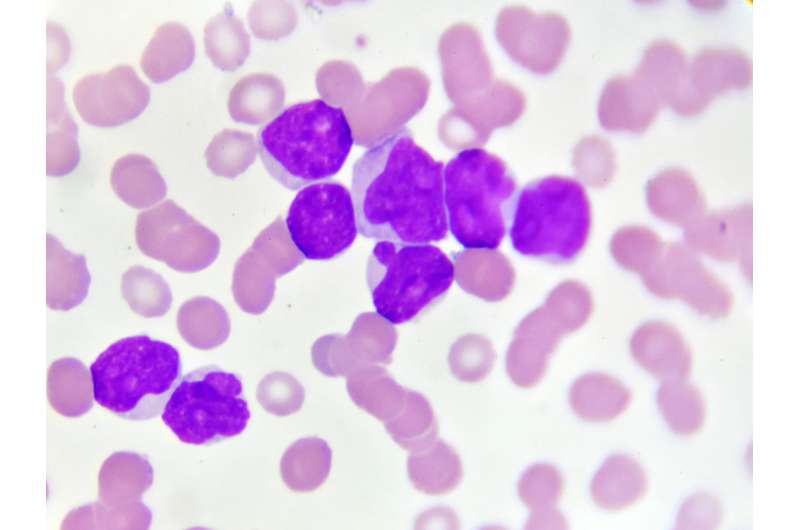FDA approves new targeted drug for leukemia

The U.S. Food and Drug Administration (FDA) has approved the first ever inhibitor drug specifically approved for treating patients with relapsed or refractory acute myeloid leukemia (AML) with a mutation in the Fms-like tyrosine kinase 3 (FLT3) gene. Patients with these mutations who have relapsed or refractory AML have very low response rates to chemotherapy at the time of relapse and their survival is poor as a result. The approval was granted for the drug gilteritinib and was based on clinical trials led by Alexander Perl, MD, MS, an associate professor of Hematology-Oncology in the Perelman School of Medicine at the University of Pennsylvania and the Abramson Cancer Center. Gilteritinib is sold under the name XOSPATA and manufactured by Astellas Pharma, Inc.
"Today's approval brings a new, highly-effective, and well-tolerated treatment option to the clinic for a group of truly high-risk patients who, until today, had no specific therapies available beyond chemotherapy to treat their disease," Perl said.
The American Cancer Society estimates there will be about 19,000 patients diagnosed with AML in the United States this year. FLT3 is the most commonly mutated gene in AML and is found in about 30 percent of patients' leukemia cells. The FLT3 gene is expressed in normal bone marrow cells and regulates the orderly growth of blood cells in response to daily demands. When the gene is mutated in a leukemia cell, however, the cancer cells grow in an uncontrolled manner unless the function of FLT3 is turned off by drugs like gilteritinib.
Gilteritinib is a pill patients take once a day, and studies have shown it can inhibit activity in AML patients with the two most common types of FLT3 mutations. The first is called FLT3 internal tandem duplication (FLT3-ITD) and is associated with aggressive disease behavior, frequent relapse, and short remission duration. The overall survival for patients with relapsed or refractory FLT3-ITD mutated AML historically has been an average of about four months with current therapies. To lower relapse risk, oncologists often recommend the most aggressive chemotherapy approaches for AML patients with FLT3-ITD, including marrow transplantation. The second FLT3 mutation gilteritinib targets occurs in the gene's tyrosine kinase domain (TKD) and is associated with resistance to a number of previously developed FLT3 inhibitors.
The FDA's approval of gilteritinib is based in part on data from a randomized phase 3 clinical trial called ADMIRAL that was led at Penn by Perl. An interim analysis from this trial showed significantly more complete remissions (CR) or CR with partial hematologic recovery (CRh) among gilteritinib-treated patients than those randomized to receive standard chemotherapy. The ADMIRAL trial itself is still ongoing, and detailed response and overall survival data are expected to be made public in the coming year.
The results from an earlier, first-in-human phase 1 and 2 trial called CHRYSALIS, were published in The Lancet Oncology in 2017 with Perl as the lead author. The trial involved 252 patients and showed 49 percent of AML patients with relapsed or refractory to prior chemotherapy and a FLT3 mutation responded to gilteritinib and their median survival was more than seven months. Patients without FLT3 mutations only rarely responded to the drug (12 percent), providing evidence that gilteritinib acts as a selective inhibitor of mutated FLT3. That trial also showed the inhibitor was generally well-tolerated. The three most common side effects attributed to gilteritinib were diarrhea in 41 patients (16 percent), fatigue in 37 (15 percent), and abnormal liver enzyme tests in 33 (13 percent). These were generally mild in severity, and only 25 patients (10 percent) had to discontinue treatment due to side effects.
"Although we're waiting for the final analysis of ADMIRAL, the available data with gilteritinib show fewer and milder side effects than typically is seen with traditional chemotherapy," Perl said. He also points out that gilteritinib is given in an outpatient setting, making it easier for patients to receive treatment.
"Often, salvage therapy is used to stabilize aggressive leukemia before a patient receives a bone marrow transplant that we hope can be curative," Perl said. "Having a low-toxicity but highly-active drug like gilteritinib means that relapsed or refractory patients not only are more likely to undergo transplant, but also they remain stronger at the time of transplant and are better able to withstand the surgery and recovery."
Finally, Perl pointed out that patients have been able to resume gilteritinib as ongoing therapy following transplant, which may provide additional protection to lower relapse rates.
Although the current FDA approval is limited to therapy of patients with relapsed or refractory FLT3 mutated AML, ongoing clinical trials at Penn are studying whether adding gilteritinib to initial therapy of newly diagnosed patients with FLT3 mutated AML can improve remission rates, prevent relapse, and improve survival.

















